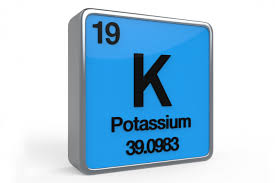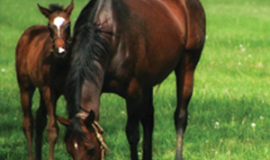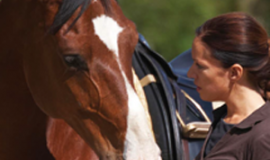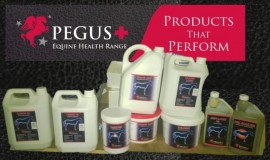Potassium (K) is the mineral (ion) found in highest concentration in all cells in the bodies of humans and animals, as well as in the cells of plants. In blood and in the fluid surrounding cells, sodium (Na) dominates, and the concentration of potassium is low. Potassium and sodium are both positive ions, and in a complicated cooperation, the two cations ensure that nerves and muscles function normally. Potassium from feed is rapidly absorbed through the gut wall and transported by the blood stream to the cells. About 75% of the potassium in the body is in skeletal muscle.

Dietary sources
Plant cells have a comparatively high potassium content, and the common grasses, silages and hays used in horse rations are therefore good sources of potassium. These forages typically contain 10 to 20 grams of potassium per kg dry matter. Cereal grains, on the other hand, contain only 2-5 grams per kg dry matter. This means that horses on rations with recommended amounts of forage, around 1,5 kg dry matter per 100 kg body weight, will receive sufficient potassium to fulfill requirements by a good margin.
Potassium requirements
For idle horses and pregnant mares, the requirement is about 5 grams per 100 kg BW. For mares in the first 3-4 months of lactation, the requirement is almost twice this amount. For young growing horses, about 5.5 grams should be given per 100 kg of BW. Exercise increases potassium requirement because of losses incurred through sweat and increased urinary excretion. For intensively exercised horses, the requirement is about twice the maintenance requirement, 10 g per 100 kg BW.
In forage-based rations, the amount of potassium will be higher than the nutrient requirement of most horses. For a 500 kg horse, this means that a ration with just 5 kg forage dry matter will provide enough potassium (50-100 grams), even when the horse is in hard use during the racing season.
Too little potassium
A potassium deficit may lead to fatigue, muscle weakness, lethargy, exercise intolerance, and decreased water and food intake. In healthy horses on rations with sufficient forage intake, signs of potassium deficiency are rarely seen.
Too much potassium
A high intake of potassium is not harmful, as the kidneys will regulate the excretion in the urine to maintain potassium balance. When potassium intake is high, it is of vital importance that the horse has free access to water at all times.
Pegus Balancing Diets
Pegus Horse Feed provide calculations for potassium requirement, as well as dietary intake and potassium balances. PC-Horse will give a warning when forage dry matter in the ration is below the recommended amount, and will, by providing guidance to the balancing of forage intake, usually also normalise potassium intake
Free Phone Helpline R.O.I.= 1800-378463 UK = 0800 011 4182







